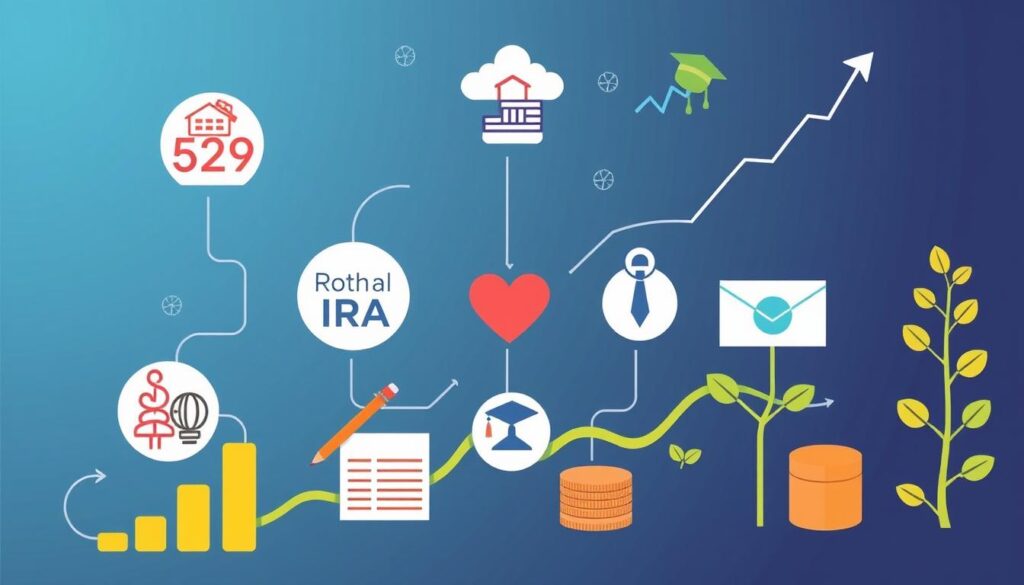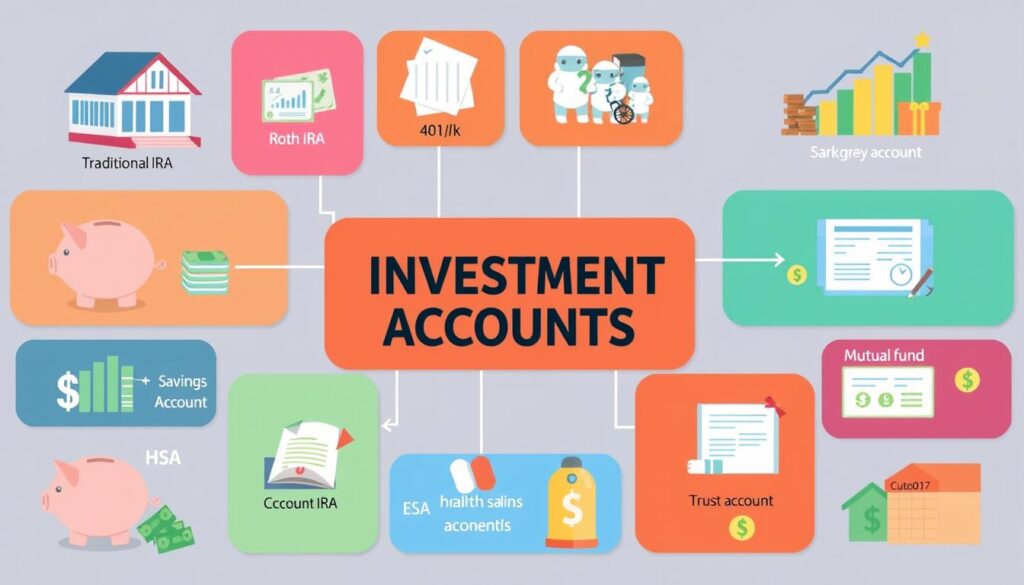Starting to invest can feel overwhelming with all the options out there. But don’t worry, we’ve got you covered. This guide will help you understand the different investment accounts available. Learning about these accounts is key to building wealth and reaching your financial goals.
Did you know that 57% of U.S. adults are invested? Yet, only one in three say they know a lot about investing. By learning about the 10 types of investment accounts, you’ll be on your way to financial success.
Knowing about different investment accounts is vital for your financial future. From IRAs to brokerage accounts, each has its own benefits and drawbacks. Exploring these options helps you create a strategy that fits your goals and risk level. For instance, you can look into passive income strategies to grow your wealth with less effort.
Key Takeaways
- Understanding the different types of investment accounts is essential for making informed decisions about your financial future.
- Investing for beginners can seem daunting, but with the right knowledge, you can set yourself up for long-term financial success.
- There are many types of investment accounts to choose from, including traditional IRAs, Roth IRAs, and brokerage accounts.
- Each type of account has its own unique benefits and drawbacks, so it’s essential to explore your options and create a personalized investment strategy.
- By learning about the 10 types of investment accounts every beginner should know, you’ll be well on your way to building wealth and achieving your financial goals.
- It’s essential to consider your risk tolerance and time horizon when selecting an investment account.
- Investment accounts can provide a range of benefits, including tax advantages, flexibility, and the chance for long-term growth.
Understanding Investment Accounts: Your Gateway to Financial Growth
Investment accounts help people reach their long-term goals, like retirement or saving for school. They offer many investment options. It’s key to know how they differ from regular bank accounts. By learning about investing, you can make smart choices for your future.
Investment accounts can grow your money more than regular savings. But, they also come with risks. It’s important to learn about investing and understand key terms. For instance, investing in a Roth IRA can grow tax-free, while a traditional IRA lets you deduct contributions from taxes.
What Makes an Investment Account Different from a Regular Bank Account
An investment account aims to grow your wealth over time. Unlike regular bank accounts, they’re for long-term investments. They offer choices like stocks, bonds, and mutual funds. Knowing about these options and their risks helps you build a portfolio that fits your goals.
The Role of Investment Accounts in Building Wealth
Investment accounts are key to growing your wealth. They offer a chance for long-term growth. By starting early and investing regularly in a tax-advantaged account, you can benefit from compound interest. Learning about investing and financial literacy is vital for making good choices.
Traditional Individual Retirement Accounts (IRAs): The Retirement Cornerstone
When thinking about money investment ideas for retirement, Traditional IRAs are key. They let your money grow without taxes until you take it out. This can help a lot in reaching financial freedom.
For new investors, Traditional IRAs are great. They’re simple to start with. You can put in a set amount each year, and it grows without taxes until you take it out. This makes them perfect for investment accounts for beginners.
When you open a Traditional IRA, remember the yearly limit. It’s $6,500 for those under 50 and $7,500 for those 50 or older. Also, know the rules about when you can take the money out and how it’s taxed. Knowing these can help you get the most from your IRA and reach your retirement goals.
Adding Traditional IRAs to your money investment ideas builds a strong base for retirement savings. This can lead to more financial freedom and security. Traditional IRAs are a key part of long-term planning, great for beginner investment accounts or those looking for investment accounts for beginners.
Roth IRA: Tax-Free Growth for Your Future
A Roth Individual Retirement Account (Roth IRA) is a great choice for beginners. It grows tax-free and lets you withdraw money tax-free in retirement. Knowing the basics of investment accounts is key to a secure financial future.
Roth IRAs are perfect for those who think they’ll pay more taxes later. To open one, your income must be under certain limits. Single filers can earn up to $161,000, and married couples up to $240,000. You can contribute up to $7,000 a year, with an extra $1,000 if you’re 50 or older.

- Diversifying your portfolio to minimize costs
- Investing in low-cost index funds, such as U.S. stock index funds and U.S. bond index funds
- Considering global stock index funds for broader geographical diversification
Learning about Roth IRAs helps you choose the right investment account. It’s a smart step towards securing your financial future.
401(k) Plans: Maximizing Employer-Sponsored Benefits
401(k) plans are a top choice for employer-sponsored retirement savings. Over 70 million Americans use them. Many employers match your contributions, giving you “free money” for retirement.
Starting with a 401(k) is a smart move. You get employer matches and tax benefits. For 2024, you can contribute up to $23,000, with an extra $7,500 if you’re 50 or older.
Here are some important 401(k) plan details:
- Contribution limits: $23,000 for 2024, with an additional $7,500 for those 50 and older
- Employer match: varies by company, but can be up to 50% of contributions
- Tax advantages: contributions are made with pre-tax dollars, reducing taxable income

Using a 401(k) plan is a smart way to invest. It’s a great start for building wealth over time.
Brokerage Accounts: Flexible Investment Freedom
Brokerage accounts give investors the freedom to choose from a wide range of investments. They are perfect for those new to finance. With these accounts, you can pick stocks, mutual funds, bonds, and ETFs to fit your strategy.
There are two main types of brokerage accounts: full-service and discount. Full-service brokerages offer advice but cost more. Discount brokerages, like online accounts, are cheaper and let you manage your investments yourself. Popular choices include Charles Schwab, SoFi Active Invest, and Fidelity Investments.

Knowing about fees and commissions is key to investing wisely. Brokerages charge different fees, such as trading and management fees. Some, like SoFi Active Invest, have low or no fees and require little money to start.
For beginners, it’s important to learn about the different types of accounts. Cash accounts require full payment, while margin accounts let you borrow money but carry more risk. Understanding these options helps you make smart choices and tailor your investment plan.
Health Savings Accounts (HSAs): The Triple Tax Advantage
Exploring types of beginner investment accounts means looking at Health Savings Accounts (HSAs). They have a triple tax benefit: you can deduct contributions from your taxes, they grow tax-free, and you can withdraw money tax-free for medical costs. This makes HSAs a top choice for those with high-deductible health plans.
For those choosing investment accounts, HSAs stand out for their flexibility and savings. In 2024, you can contribute up to $4,150 if you’re single or $8,300 if you’re with a family. If you’re 55 or older, you can add an extra $1,000. This makes HSAs a great option for types of beginner investment accounts that can grow over time.

- Tax-deductible contributions
- Tax-free growth
- Tax-free withdrawals for qualified medical expenses
- No required minimum distributions (RMDs)
- Multiple investment options
Understanding HSAs’ benefits helps you make smart choices when choosing investment accounts. They’re among the best beginner investment accounts for saving and investing for the long term.
529 College Savings Plans: Investing in Education
529 College Savings Plans are a top choice for saving for a child’s education. They offer tax benefits and are great for learning about investing. Understanding these plans is key to making smart financial decisions.
These plans let you withdraw money tax-free for education costs like tuition and room. Some states even offer extra tax breaks. It’s important to know the investment options, like age-based plans that adjust as your child grows.

- High contribution limits, ranging from $235,000 to over $550,000, depending on the state
- No annual contribution limits, but contributions exceeding the annual gift tax exclusion may impact the lifetime estate and gift tax exemption
- Tax-free investment growth and withdrawals for qualified education expenses
- Flexibility to change beneficiaries at any time
529 College Savings Plans help you invest wisely for your child’s education. With the right knowledge, you can secure their future. Start learning about investing and make a difference in their life.
Certificates of Deposit (CDs): Low-Risk Investment Options
Exploring money investment ideas means looking at options that balance risk and reward. For those aiming for financial freedom, Certificates of Deposit (CDs) are worth considering. CDs are a type of beginner investment account that offers a fixed interest rate for a set period. This period can range from a few months to several years.
CDs are known for their low-risk nature. They are insured by the FDIC, which guarantees deposits up to $250,000. This makes CDs a great choice for those who want to steer clear of the stock market’s ups and downs. Plus, CDs often have higher interest rates than regular savings accounts, making them appealing for investment accounts for beginners.
Some key features of CDs include:
- Fixed interest rate for a specified period
- Low-risk investment option
- FDIC insurance up to $250,000
- Higher interest rates than traditional savings accounts
While CDs might not offer the highest returns, they provide a stable and secure way to grow your savings. Adding CDs to your investment strategy can help diversify your portfolio. This balance of risk and return is beneficial for both seasoned and new investors. CDs can be a valuable part of your money investment ideas.

Money Market Accounts: Balancing Liquidity and Returns
Exploring beginner investment options means knowing about different investment account types. Money market accounts are great because they mix liquidity with returns. They have higher interest rates than regular savings accounts, with rates around 0.61% as of October 2024.
Money market accounts are insured by the Federal Deposit Insurance Corp. (FDIC) up to $250,000 per depositor per institution. This insurance adds security for investors. Plus, these accounts let you write checks and use a debit card, making it easy to get to your money.

- Higher interest rates than traditional savings accounts
- Liquidity and easy access to funds
- FDIC insurance up to $250,000 per depositor per institution
- Check-writing privileges and debit card
Learning about investment account basics and different investment account types helps investors make smart choices. Money market accounts are a good choice for a portfolio. They offer a safe spot for emergency funds or short-term savings.
10 Types of Investment Accounts Every Beginner Should Know: Making the Right Choice
Choosing the best investment accounts starts with knowing your risk level and how long you can wait for returns. This helps you pick the right accounts for your goals and situation. Think about how you feel about market ups and downs and how soon you need your money.
Risk Tolerance Assessment
Understanding your risk tolerance is key when picking investment accounts. Beginners might start with safer options like high-yield savings or CDs. These offer steady returns. Later, you can explore other options like index funds or ETFs for a balanced investment.
Time Horizon Considerations
Your time frame for investing matters too. For long-term goals, you might take on more risk with investments like stocks or mutual funds. But, if you need your money soon, go for liquid accounts like money market funds or Treasury bills.
By matching your risk level and time frame, you can tailor your investment plan. Diversify your investments and check your portfolio often to keep it on track. With the right accounts and knowledge, you’re on your way to financial success.

Robo-Advisor Accounts: Modern Automated Investing
Starting with investment accounts can feel daunting. But, with the rise of beginner finance accounts, it’s easier to begin. Robo-advisor accounts are a great choice for both new and seasoned investors. They use algorithms to manage your investments based on your risk level and goals.
Robo-advisors are known for their low fees. Platforms like Betterment and Wealthfront charge under 0.4% annually. This is much less than what human advisors charge, often around 1%. Some even offer investment services with no fees or commissions.

When picking a robo-advisor, think about what you need. Some key features include:
- Low or no minimum balance requirements
- Low fees and no commissions
- Diversified investment portfolios
- Tax harvesting services to minimize capital gains taxes
The robo-advisor market is expected to boom, growing from $9.50 billion in 2024 to $72.00 billion by 2032. As a beginner, it’s key to use these platforms’ guidance. Start building your portfolio today.
Custodial Accounts: Starting Young Investors Early
When looking at types of beginner investment accounts, custodial accounts are a great choice for adults managing money for minors. They help start building wealth early and teach important lessons about money and investing. Adults can make smart choices when choosing investment accounts for the young ones in their lives by understanding custodial accounts.
Custodial accounts offer tax benefits, like up to $1,250 of earnings being tax-free in 2024. They also let you contribute up to $18,000 without worrying about gift tax. But, it’s important to think about how these accounts might affect financial aid, as they are seen as the child’s assets. When picking the best beginner investment accounts, weighing these points and the young investor’s long-term goals is key.
Popular custodial account options include UGMA/UTMA brokerage accounts with no limits, and the Fidelity Youth Account with no fees or minimums. By looking into these and thinking about the young investor’s needs and goals, adults can help them start strong financially. This way, they can make the most of their types of beginner investment accounts.
In the end, custodial accounts are a great way to teach young investors about saving and investing. By starting early and making smart choices about choosing investment accounts, adults can help the next generation develop good financial habits. This can lead to long-term financial success.
Your Path to Investment Success: Taking the First Step
The world of investment accounts is full of choices for beginner investors. You can pick from traditional IRAs and 401(k)s to more flexible brokerage accounts and HSAs. The goal is to find the best match for your financial dreams and how much risk you’re willing to take.
At first, the 10 types of investment accounts might seem too much. But the most critical step is to start. Open an account and put in a little money each time. This way, you’ll start earning compound interest and growing your wealth for the future.
Remember, investing for beginners is a long-term journey. It’s not a race. Stay patient, keep learning, and enjoy the journey of growing your finances.

